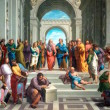How Thomists View the Modern Sciences
by Thomas M. Cothran
Filed under Uncategorized

Debates concerning the existence of God typically run aground on prior unresolved metaphysical questions. Any debate with a Thomist about the existence of God turns into an exposition of a number of metaphysical notions – potentiality, actuality, matter, form, essence, existence, motion, cause, and effect. Skeptics tend to quickly recognize that they are not only being asked to accept the existence of God, but an entire metaphysics. Often enough, the effect is not only a continuing disbelief... Read More
And This All Men Call God
by Thomas M. Cothran
Filed under God

Wheaton College’s decision to suspend a Christian professor who proclaimed that Muslims and Christians worship the “same God” has sparked a debate among Christians. Despite the dogmatic differences between Christians and Muslims, is the same God the object of our worship and belief? Ours is not the first age in which a Christian culture has clashed with the Islamic world, nor the first in which Western states have lived in fear of violence or occupation. It is not even the first time that... Read More
Understanding Who God Really Is
by Thomas M. Cothran
Filed under The Existence of God

NOTE: This is the third and final part of a three part series on classical theism by theologian Thomas M. Cothran. Be sure to read part one and part two. Any defense against Stephen H. Webb’s critique of classical theism must, then, defend some particular form of classical theism that does have an ontology. Webb declares that “Aquinas is the best representative of what is often called classical theism,”1 and so for the remainder of this article, we will consider whether Webb’s arguments... Read More
A Bad Case Against Classical Theism
by Thomas M. Cothran
Filed under The Existence of God

NOTE: This is the second of a three part series on classical theism by theologian Thomas M. Cothran. Read part one here. Stephen Webb not only misstates what classical theists believe, he misstates why they believe it. Consider, by way of example, Webb’s review of David Bentley Hart’s The Experience of God. Webb claims that Hart infers “the main tenets of classical theism … from the deceptively simple premise of God’s immateriality.” Webb attributes a similar line of reasoning—namely... Read More
What is Classical Theism?
by Thomas M. Cothran
Filed under The Existence of God

NOTE: This is the first of a three part series on classical theism by theologian Thomas M. Cothran. Over the last few years, Stephen H. Webb has waged a crusade of sorts against classical theism, especially with respect to its notion of divine transcendence. Webb has authored, by my count, no less than 10 articles on the subject at First Things1, and similar critiques have also been central to his books Mormon Christianity and Jesus Christ, Eternal God. Perhaps surprisingly, Webb is not... Read More
How Should We Speak of God? A Response to Daniel Linford
by Thomas M. Cothran
Filed under Atheism, The Existence of God

Last December, an article by Daniel Linford entitled "Do Atheists Reject the Wrong Kind of God? Not Likely" appeared at Scientia Salon. Certain recent "popular books,” according to Linford, have advanced a "mystical" notion of God, arguing that contemporary atheists have directed their disbelief only toward "smaller" conceptions of the divine. Three contemporaries are singled out: Karen Armstrong, John Haught, and David Bentley Hart. On what Linford denominates the "mystical" view, God is radically... Read More







